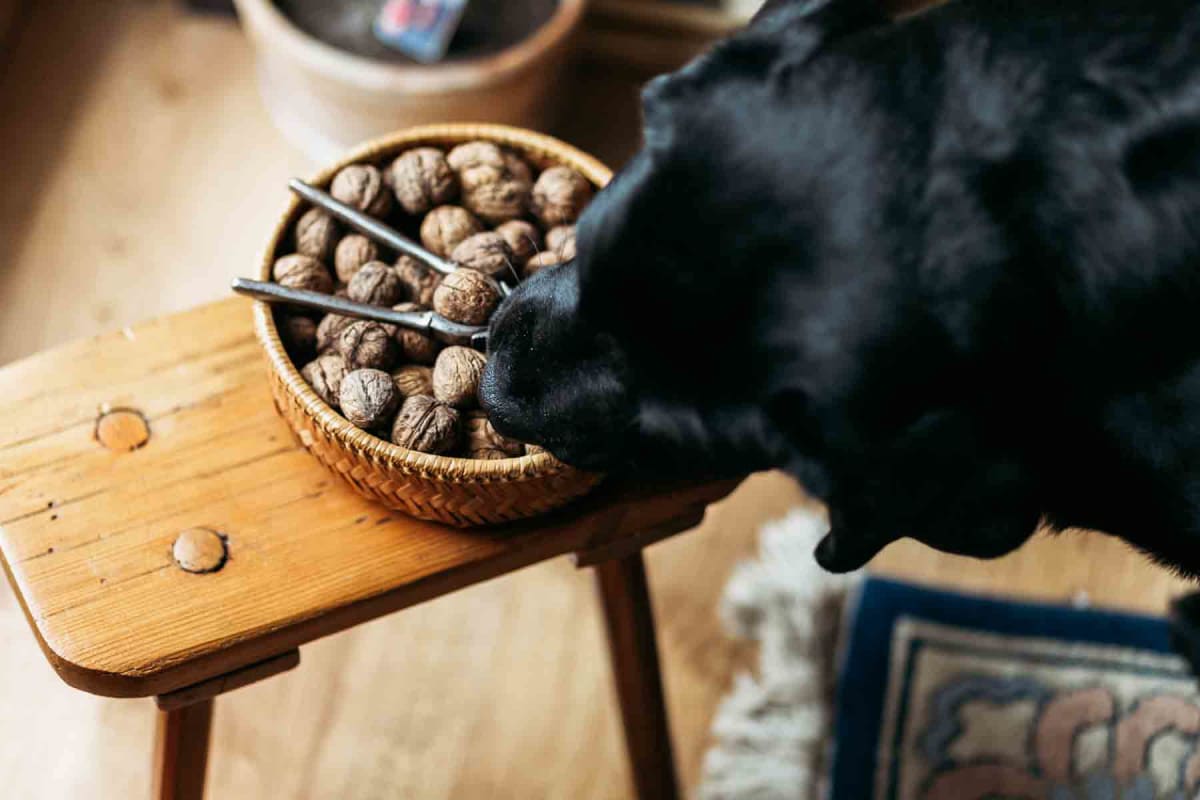
Can dogs eat walnuts?
Can dogs eat walnuts?
Can dogs have walnuts?
If you've ever caught your furry friend eyeing your walnut snack, you might wonder if sharing is a good idea. The short answer is no, dogs should not eat walnuts. While not all walnuts are toxic to dogs, they pose several health concerns that make them a poor choice for canine consumption.
Store-bought walnuts that have been processed for human consumption may not be immediately toxic, but they still carry risks that outweigh any potential benefits for your pup.
Wild walnuts or those that have fallen from trees are especially dangerous, as they can develop a type of mold that produces mycotoxins, which are highly toxic to dogs.
Are walnuts bad for dogs?
While it's true that not all walnuts are immediately toxic, they are generally considered bad for dogs for several important reasons:
High fat: First, walnuts contain high levels of fat that can cause digestive upset and potentially lead to pancreatitis, a painful and sometimes life-threatening inflammation of the pancreas.
Physical hazard: The size and hard texture of walnuts also present a choking hazard, especially for smaller dogs. Even when chewed, the sharp pieces can damage your dog's digestive tract.
Toxicity: Black walnuts contain a compound called juglone, which can cause neurological symptoms and other serious health problems.
Mold: Any moldy walnuts (which might not be visible to the human eye) can produce mycotoxins that cause tremors, seizures, and other neurological issues in dogs.
Different types of walnuts
Not all walnuts carry the same level of risk:
English Walnuts: These are the most common type found in stores. While less toxic than black walnuts, they still pose risks due to their fat content and potential for mold growth.
Black Walnuts: Native to North America, these contain juglone, a toxin that can cause vomiting, seizures, and other severe symptoms in dogs. They are considered extremely toxic to canines.
Symptoms of walnut toxicity in dogs
If your dog has consumed walnuts, watch for these warning signs:
Vomiting or diarrhea
Lethargy or weakness
Tremors or seizures
Loss of coordination
Excessive drooling
Loss of appetite
Increased thirst and urination
These symptoms may appear within hours of consumption or develop over several days, depending on the amount eaten and the specific type of walnut.
What to do if your dog ate walnuts
If you discover your dog has eaten walnuts, don't panic, but do take prompt action:
Try to determine how many walnuts your dog consumed and whether they were black walnuts or regular walnuts. This information will help your veterinarian assess the situation.
Contact your veterinarian immediately. They may advise you to monitor your dog at home or bring them in for an examination, depending on the quantity consumed and your dog's size.
Do not induce vomiting unless explicitly instructed to do so by your veterinarian. Incorrectly inducing vomiting can cause additional harm.
If your regular vet is unavailable, contact your nearest emergency veterinary hospital or the ASPCA Animal Poison Control Center at (888) 426-4435.
Keeping your dog safe around nut trees
If you have walnut trees on your property or frequently walk in areas with these trees, take these precautions:
Regularly clean up fallen walnuts from your yard before they have a chance to develop mold or be discovered by your curious pup.
Keep your dog on a leash during walks in areas with walnut trees, especially during the fall when nuts are dropping.
Consider fencing off areas with walnut trees if you cannot consistently monitor your dog or clean up fallen nuts.
Train your dog with a reliable "leave it" command to prevent them from picking up food or other items from the ground during walks.
Alternatives to walnuts
If you're looking for healthy treats to share with your dog, consider these safer alternatives:
Plain, unsalted, xylitol-free peanut butter is safe for dogs and can be a delicious, protein-rich treat for most dogs when given in moderation.
Some dog-safe fruits and vegetables make excellent snacks, including small pieces of apple (without seeds), blueberries, carrots, and cucumber.
Commercial dog treats specifically formulated for canine nutrition are always a safe bet when given according to package instructions.
For dogs who enjoy crunchy textures, try freeze-dried meat treats or specially formulated dental chews that also help clean their teeth.